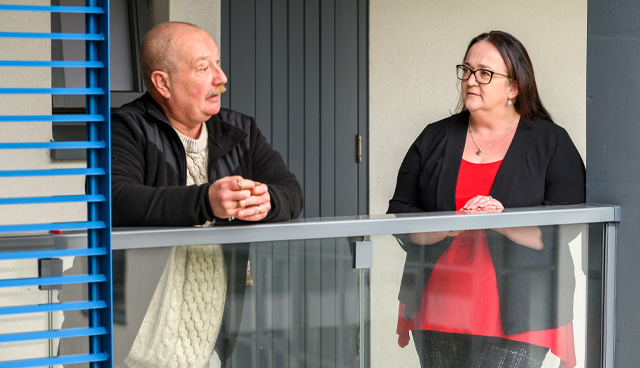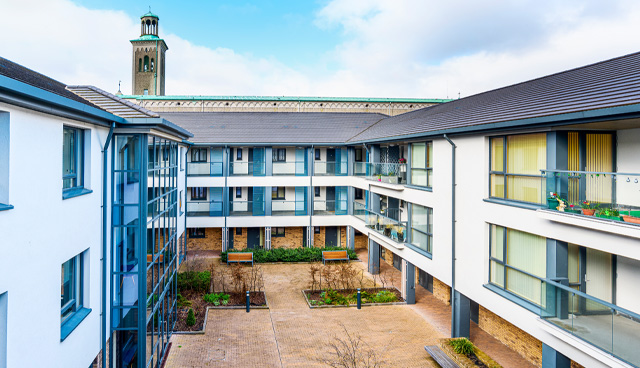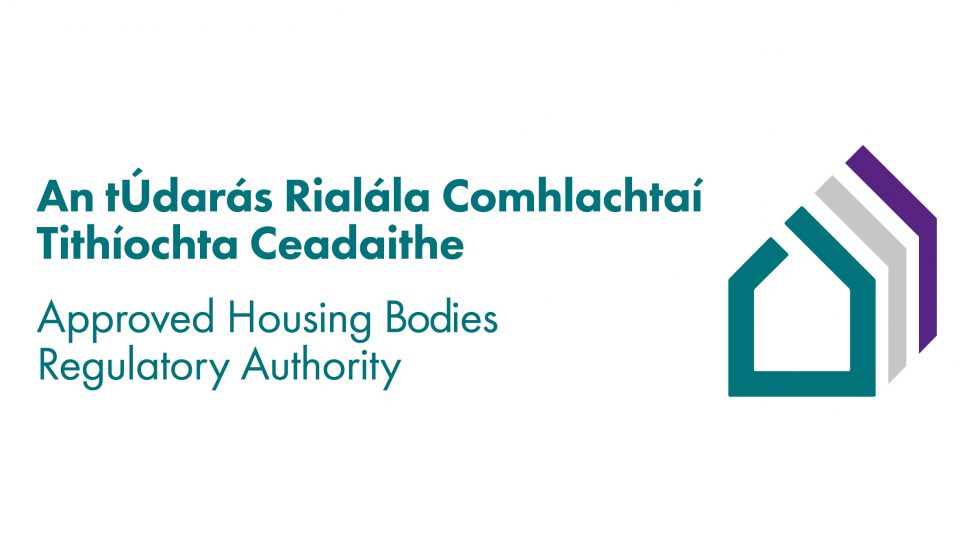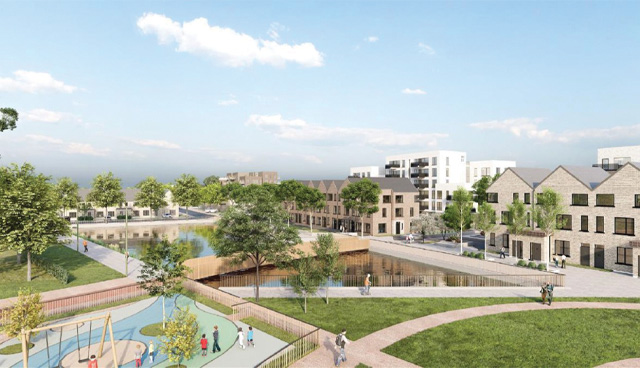
Time to think beyond the house: A critical response to the climate and biodiversity crises
1st June 2021
Housing Minister Darragh O’Brien TD: “A matter of moral urgency”
1st June 2021Ageing in place

Ciarán Galway speaks with Aoife Flynn Kennedy, Head of Clann, about collaborating in the era of Covid to deliver age-friendly housing.
A component of Clúid Housing, Clann was established in January 2020 as an age-friendly housing body with a vision for “a society where everyone has a great place to live”, which it aims to deliver through the provision of “quality housing and services to enable people to create homes and thriving communities”.
Clann’s primary ambition is the delivery of enhanced age-friendly housing options for those aged 55 and over and the housing body is already delivering the largest age-friendly social housing development programme in Ireland. One of the main factors informing this programme is Ireland’s ageing population.
“The population has grown progressively older since the 1980s,” Flynn Kennedy notes, adding: “By 2030, we’re going to have 20 per cent of the population aged over-65 and by 2050, there will be one million people over the age of 65.”
In response, Clann is proactively planning ahead to mitigate potential future housing shortages through the timely delivery of more age-friendly and appropriate housing, enabling people to continue to live independently for as long as possible.
“There have been many conversations about the housing crisis in general, but this particular age group has specific needs which have been neglected. Therefore, Clúid Housing undertook a survey of residents who were living in what was previously classed as ‘housing for older people’. Those residents identified a requirement for specific housing to meet their needs. Allied to this is the increasingly popular concept of age-friendly housing and ageing in place. Subsequently, these factors informed Clúid Housing’s decision to establish Clann,” the Head of Clann explains.
Age-friendly housing
Age-friendly housing is distinct from traditional sheltered housing for older people. It is informed by universal design, the principles of which are independence and autonomy, to ensure the accessibility and adaptability of a dwelling as a person’s circumstances change.
As well as the physical space, age-friendly housing considers the importance of a dwelling’s location. For instance, complemented by a cognisance of connection with community, Clann schemes are located near shops and other amenities.
“The over-55 cohort includes people with the most skills, the most experience, and the greatest ability to give something back to the community. We want them in the heart of the community where they can contribute.”
“Access to Clann schemes extends from those aged 55 and beyond. The objective is to enable people to live independently for as long as possible. We are also focused on enabling people to maintain the connection they have with their community.
“The over-55 cohort includes people with the most skills, the most experience, and the greatest ability to give something back to the community. We want them in the heart of the community where they can contribute,” Flynn Kennedy adds.
While seeking to ensure that people ‘rightsize’ at the right time, Clann also aims to ensure that they do so in the right place. “If I have grown up in a town all my life and then I want to rightsize, then I want to do so within that same town. I don’t want to have to move somewhere else and disconnect from my circle of support.
“As Clann schemes expand into more towns and villages, more people can have that choice. While leaving a family home containing years of memories can provoke some nervousness, our residents have articulated the benefits of doing so, including enhanced security and the absence of fuel poverty.”
Exceptional standards
While the Head of Clann acknowledges that some people might have a preconceived idea about social housing being a substandard level of accommodation, Broome Lodge in Cabra, Dublin (pictured) is an archetypal scheme which gives lie to that notion. “Each of Clann’s schemes across the country are exceptional and they really challenge the perception of what social housing is,” she indicates.
Indeed, at the annual all-island Chartered Institute of Housing (CIH) awards in 2020, Clann was nominated for an award to recognise its promotion of age equality in housing. Clann was also shortlisted for three CIH awards in 2021.
“Clann doesn’t merely look at the house that the person is living in, it also looks at the person that is living in the house. At all times we are led by the individual.”
Subsequently, Michael Lynch, a resident from the Ard Carrig scheme in Cork and chair of the Clann Residents Advisory Group, won the Housing Hero of the Year award in recognition of his achievements in the past year.
“On the night, he was the only resident from all the nominated organisations who won an award. That is what Clann is about. Our role is to work in the background, providing the assistance required so that our residents can lead the way in the delivery of the service. They are experts and better understand their needs than anybody else.
“As a musician, Michael led on a Zoom music session initiative and he won the award for the work he has done in his own community, as well as on a wider scale when the pandemic hit. Michael asked for the events to be programmed and then took control of its delivery. Michael personifies what Clann is about.”
Choice
For many older people, their current accommodation is unsuited to their needs, according to Flynn Kennedy. For example, the bathroom is upstairs, there is no downstairs bedroom or there are steps at the entrance. Recognising that if people are provided with adequate supports in an environment conducive to independent living, then nursing home care is not necessarily an inevitability, Clann has identified a gap in the market.
“Nursing home care will always have a place and it is not to say that choosing a nursing home is a bad option. Rather, having to choose a nursing home because you have no other choice is wrong.
“Unfortunately, at the moment, that’s not a choice that everyone has. We want to ensure that there are Clann schemes available in all counties so that people can make those decisions. To do this we work with our partners such as Age Friendly Ireland, Alone and the local authorities. There is real interest in this area, so we will continue this work in coming years,” the Head of Clann insists.
Independence
Many Clann residents emphasise the benefits of making personal decisions about who can access their home, how they spend their free time and whether they continue to work. Likewise, the Head of Clann identifies this element of true independence and autonomy as one major difference when compared with traditional sheltered housing for older people.
“This allows people to age in place, to stay in their own home and to avoid moving because their needs have changed. The home or the wider scheme is built in a way that changes with them.
“If a resident needs support, each Clann site has a Scheme Manager whose role is to signpost and assist access to services in the community. They don’t provide healthcare supports and they don’t do people’s shopping, but our Scheme Managers can link residents into services in the community. We class it as fully independent living. Like you and I, Clann residents want the freedom to make decisions about their own lives,” she asserts.
Resident input
Clann places significant emphasis on the voice of residents and ensuring that it delivers its service through a partnership approach. Consequently, during the Covid lockdown, the housing body established the Clann Residents Advisory Group.
“We worked with Community Action Network and undertook online training with a number of volunteer residents, reflecting the objectives of the Residents Advisory Group. This meant understanding missions, values and how they were going to have their voice heard, ensuring that they were part of delivering the service,” Flynn Kennedy indicates.
Clann also conducts residents’ surveys. One comprehensive survey of Clann residents during the lockdown returned an 85 per cent satisfaction rate. “Given the year that we have all had, that is fairly significant,” she adds.
Pivoting online
As a result of the Covid-19 pandemic, Clann was forced to relocate its Scheme Managers offsite and integrate a programme of remote working. The move to online exposed a digital gap that was a challenge for Clann residents.
“We did face many challenges. For instance, we were introduced to the word ‘cocooning’ which, reflecting the mood of the wider world, did not sit well with our residents at all. Telling someone that because they are a certain age that they should stay indoors and not see other people was a challenging concept for many people,” the Head of Clann reflects.
Simultaneously, however, the age-friendly housing body benefited from greater links with partners such as Alone, which alongside Vodafone, provided smartphones to residents. “This enabled us to link in with more technologically literate residents. Our community events then moved offsite and online. Residents hosted Zoom events throughout the pandemic, including music sessions, yoga and everything in between,” she remarks.
“We also linked in with Safe Home Ireland which is an organisation which brings older people back to Ireland from abroad. We brought four people home from England and one from the USA who emigrated many years ago and now, in their later stages of life, wanted to return to their country of birth.”
Acknowledging the challenges posed by Covid since March 2020, Flynn Kennedy pays tribute to the resilience of the Clann residents and the efforts of her colleagues. “Since the onset of the pandemic, our residents have exhibited the depth of their resilience. It was tough, yet we opened new schemes and added new homes. These were challenging undertakings during the pandemic. However, with the expertise of the Clann team, we delivered.
“Similarly, we received significant support from communities across the country. The community call that was set up in each of the local authorities undertook the collection of prescriptions, the delivery of food, and the production of hampers,” she says.
Maintaining a connection and engagement
Overall, improved housing options and the provision of community services go hand in glove. “I think that’s where our plan has excelled. Clann doesn’t merely look at the house that the person is living in, it also looks at the person that is living in the house. At all times we are led by the individual.
“It’s about retaining the sense of autonomy which we grow accustomed to before reaching a certain point in our lives whereby people suddenly don’t believe that we should have that autonomy anymore. Clann is challenging that misconception and arguing that it doesn’t really matter what age a person might be, independence and security continue to be important. Clann seeks to create an environment which facilitates this,” Flynn Kennedy explains.
Within Clann schemes, a 24/7 emergency response is installed in each home. Likewise, scheme managers undertake wellbeing calls and check ins. When the Covid-19 pandemic transpired, therefore, Clann was well positioned to ensure that each resident’s requirements were being met, as per their personally defined needs.
Much of what scheme managers do is informal. The majority of their work is focused on the wellbeing of individuals and ensuring that they are connected. This is a more difficult task in the absence of face-to-face interaction.
Moving things online, however, meant that travel was no longer an issue and it negated mobility requirements. This meant that friendships developed between people in disparate locations and contact was maintained beyond Zoom events.
“As we seek to emerge from the pandemic, one of the lessons we have learnt is that the online element of the service we provide will need to continue. Our residents have become much more technologically literate and we have witnessed an unprecedented migration to online banking and people embracing new technologies that they never anticipated. That will continue going forward, though we are really looking forward to getting back to normality and face-to-face interaction,” the Head of Clann affirms.
Ambitions
Clann has an ambitious growth programme scheduled for the next two years. At the moment, the housing body has approximately 800 homes across Ireland, with an additional 800 due to come onstream by the end of 2022.
“That will be our primary focus. We know that there are many people over-55 who have been waiting on housing lists in some local authority areas for over 10 years. The supply of one bedroom accommodation has not been to the forefront, however this is now changing. There also hasn’t been the focus on universal design as a basic principle for housing. As such, we have many people who are in real need of a home,” she highlights.
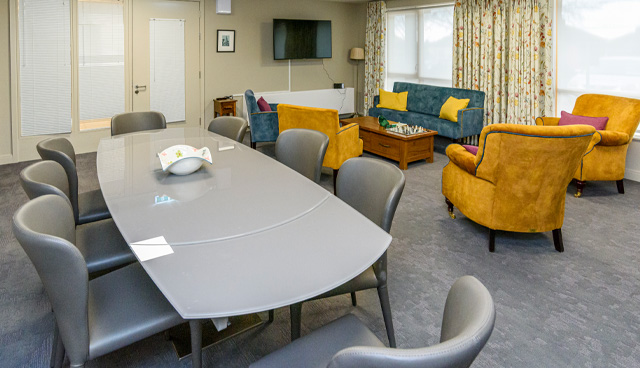 Amplifying the voice of Clann residents is another major priority. During lockdown, the housing body collaborated with Two Moons, an EU funded programme which prioritises social inclusion for older people. The programme educates people in that age bracket about their human rights; what they are and how to assert them.
Amplifying the voice of Clann residents is another major priority. During lockdown, the housing body collaborated with Two Moons, an EU funded programme which prioritises social inclusion for older people. The programme educates people in that age bracket about their human rights; what they are and how to assert them.
“Our staff have undertaken the Two Moons training this year and Clann will roll it out across all schemes, in collaboration with residents on the Clann Residents Advisory Group in the year ahead. It’s going to be a busy year for Clann and we’re hoping for the restrictions to be lifted so that we can get out there,” Flynn Kennedy suggests.
Partnerships
However, Flynn Kennedy acknowledges that age-friendly housing cannot be delivered in isolation and Clann is actively seeking partnerships and collaboration. “We can deliver the physical homes and ensure that they are constructed in a manner which makes them accessible and enables people to age in place. However, life is not just about the roof over our head; it is also about our engagement with the wider community and that is where we see the partnerships being hugely important. We work in partnership with communities to make and maintain connections,” she says.
Crediting the local authorities for their support in developing Clann’s schemes and providing funding for the development of gardens, the delivery of exercise classes and an array of additional projects, Flynn Kennedy indicates that the applications for funding often originate from residents’ associations within the schemes.
At the same time, developers have shown great interest in Clann schemes. “We pursue design and build or buy directly and we have observed an increase in developers considering age-friendly housing as an option. We have a design guide outlining what Clann requires in a scheme in terms of universal design, communal space and the principles that define an age-friendly housing scheme. Certainly, if that is what a developer can provide then we are interested in having conversations with them,” she concludes.
Profile: Aoife Flynn Kennedy, Head of Clann
With over 20 years’ experience in housing services, disability rights and community engagement, Aoife Flynn Kennedy was appointed as Head of Clann in January 2020. Prior to her current role, Flynn Kennedy worked for seven years in the disability sector, supporting people in their move from congregated settings into their own homes. Before that, she worked for three different local authorities in the areas of housing, access, and equality. Outside of work, she is a community activist and is involved locally in addiction services, establishing Bray as the next autism friendly town and she chairs a local approved housing body (AHB) as well.


